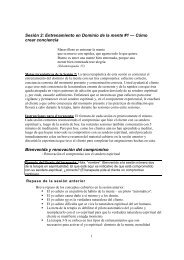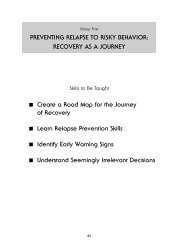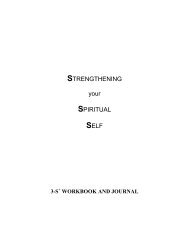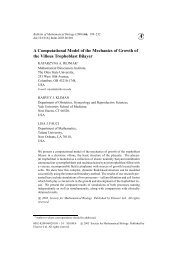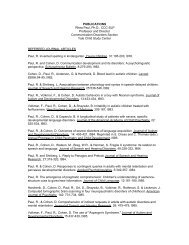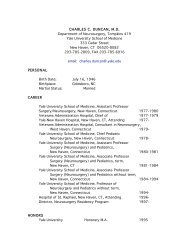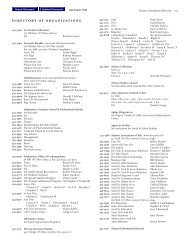The Spiritual Self Schema (3-S) Development Program
The Spiritual Self Schema (3-S) Development Program
The Spiritual Self Schema (3-S) Development Program
Create successful ePaper yourself
Turn your PDF publications into a flip-book with our unique Google optimized e-Paper software.
First consider your mind wandering -- what was the typical theme of<br />
your daydreaming last week when your habitual self-schema was being<br />
accessed (was it worry, fear, desire for something you want, aversion<br />
towards something you don't want, fantasy, memories of the past,<br />
anticipation of future outcomes, ... ?) How would you describe the<br />
general theme of your daydreaming last week?<br />
Next list one cognitive script -- what did you tend to tell yourself last<br />
week (was your inner-dialogue encouraging you, was it chastising you,<br />
...?) Describe a typical cognitive script.<br />
<strong>The</strong>n list a feeling -- how did you typically react emotionally to<br />
whatever was going on (would you characterize a typical emotional<br />
reaction as agitation, depression, satisfaction, ... ?) Describe a typical<br />
emotional reaction experienced last week.<br />
Finally, list a typical behavior -- what behavioral action sequence do<br />
you associate with the habitual self-schema that was active during the<br />
past week (was it a sequence of behaviors for making money, providing<br />
care to others, self-improvement, ...?) What specific behavioral action<br />
sequence do you associate with the habitual self-schema that was active<br />
during the past week?<br />
Step 3: Increasing awareness of the consequences of your<br />
habitual self-schema(s)<br />
Reflect. Does my habitual path relieve, or contribute to, suffering?<br />
Mine? Others?<br />
Sometimes when we go on "automatic pilot" -- after our mind<br />
wanders and our cognitive scripts, habitual emotional responses,<br />
and behavioral action sequences are activated -- we inadvertently<br />
harm ourselves or others. Consider the consequences of your own<br />
habitual ways of experiencing and expressing yourself last week<br />
that could potentially cause harm.<br />
Rehearse (visualization): Visualize the actor once again, this<br />
19



